#lexicographer
Photo

Source details and larger version.
20 notes
·
View notes
Text



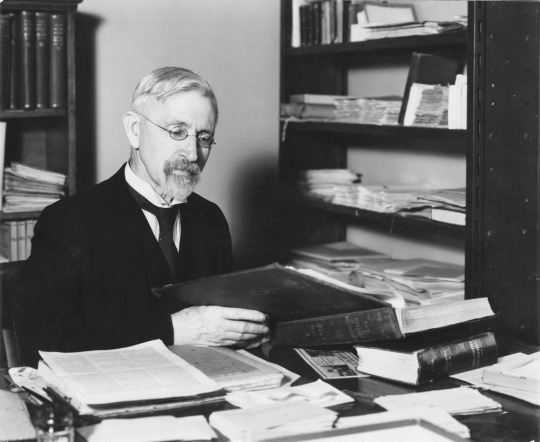
On 13th August 1867 Sir William Craigie, the Scottish lexicographer, was born.
One thing you cannae say about Sir William Craigie is, “He was a man of few words.” In fact, he was a man of many words; easily hundreds of thousands of words; more likely millions of words. In his day, Sir William was regarded as the foremost – nay, the most eminent – lexicographer, but he was also described as a language and literature scholar, and a philologist.
Isn’t it funny that us Scots started some of the most famous English establishments, like William Paterson who gave them The Bank of England, it took a Scotsman from Dundee to put the English language into a decent semblance of order, after he was engaged to work on what was then called the ‘New English Dictionary’ and which is now commonly referred to as the ‘Oxford Dictionary’ or the ‘Oxford English Dictionary’. He was editor of the dictionary for over 30 years.
He was also keen to promote the Scots language and pioneered a Dictionary of the Older Scottish Tongue. Craigie also worked on an Oxford edition of Hans Christian Andersen tales.Not content with sorting out the Scots and English words, Craigie went to the United States to work on the ‘Dictionary of American English’, Cragie also lectured on lexicography at the University of Chicago, where he taught many 20th Century American lexicographers of note.
With all this going on his pet project the Scots dictionary in was put on the back burner until 1921, when he began to make significant inroads towards producing ‘A Dictionary of the Older Scottish Tongue; From the Twelfth Century to the End of the Seventeenth’. Despite continued research into the Scots language, from a first publication in 1931 up until the end of his life, Craigie never managed to complete that work, however, the project he pioneered has been completed. Since 2004, thanks to the charitable organization, Scottish Language Dictionaries Ltd., twelve volumes are available, free to search, via the Internet at the bottom of this post.
Cragie’s brainchild is now known as ‘DOST’ and covers the language from the era of ‘pre-literary’ Scots, when there was a very meagre, extant literary output (literally nothing more than Barbour’s ‘Brus’ and the ‘Legends of the Saints’), through that of ‘early’ Scots (1375 to 1450), to ‘middle’ Scots (up to 1700). The dictionary was intended to present the entire Older Scottish vocabulary as it was preserved in literary, documentary and other records.
Sir William Alexander Craigie died at the age of ninety years and one month, in Watlington, Oxfordshire, on the 2nd of September, 1957.
8 notes
·
View notes
Text
If dictionaries are an authority on words, and Dictionary.com follows me, what does that make me?

2 notes
·
View notes
Text
Amateur teen anal outdoor Petite, tattooed, and highly pretty, Gina
How I met my girlfriend Gina Valentina
Smashing a thick redbone
cum inside nathaly
Attractive gal Holly Michaels gets penetrated deep
Naked oriental legal age teenager gets males to flood her with sperm on face
Horny busty wife strips and masturbates passionately
Ketteryn villar Rebolando a bunda gostosa
Masturbando a mi mujer con vibrador y se viene
La Caliente pepina chilena se mete botella en el culo y en la concha video llamada
#sin-absolving#dimble#forbow#gybed#addax#friezed#papa#Zardushti#overgraciously#back-set#Laelaps#renoticed#lexicographer#Gurney#mayflowers#anthoid#hydroxides#transl#carburetor#namkook
0 notes
Text
I HAVE LEARNED TODAY
THAT ONE CAN BECOME A LEXICOGRAPHER
THIS HAS EXCITED MY NEURODIVERGENT BRAIN BECAUSE I LOVE WORDS
IF ANYONE HERE IS ONE, CAN U TELL ME ABOUT UR JOB, PLS
#me thinks a thought#lexicographer#I wanna be a dictionary assembler#I promise I would be so good at it
0 notes
Text
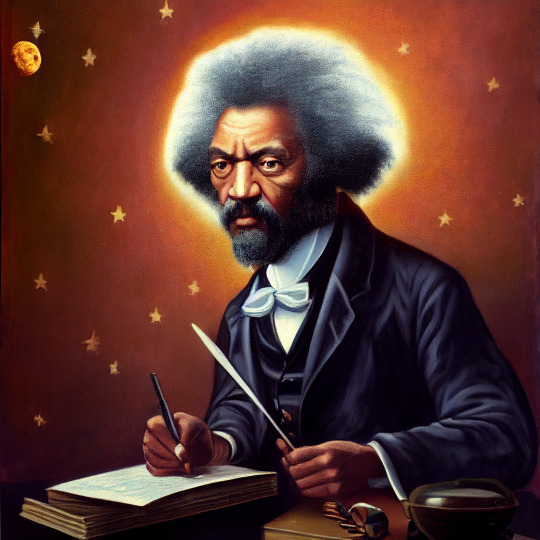
Frederick Douglass as a lexicographer.
0 notes
Note
um um um um. *stumbles in and looks around.* word… what is a word… how about disoriented >:33
what IS a word?? I ask myself that often
also i've never written any felix before so AAAAAAA grain of salt don't look at me
Prompt: disoriented
Argos jolted as the body was pressed into his arms.
“Take him!” Ladybug cried.
“Why–”
“Just do it!” She darted away, leaving him alone with a disoriented and faded Chat Noir, having just taken a hit in her stead.
Argos grunted, finding a hidden spot to settle in with the weakened hero. They hadn’t had much time, just the two of them, and he was at a loss on why Ladybug chose him for the task.
“...wrong?” Chat garbled.
“Nothing,” he replied. “Just trying to understand why babysitting duty was left to someone you hate.”
“Could… nev’r… hate you, Félix.”
Send me one word, I'll write you 100
#fun fact i wanted to be a lexicographer when i was younger so i do think about what words are often#actually i still want to do that but shhh#hundred word drabbles#my writing#miraculous#noctie
36 notes
·
View notes
Text
Milestone Monday


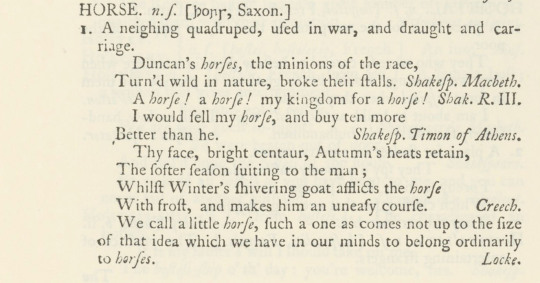


Happy National Dictionary Day!
Although the day was introduced to honor the birthday of American lexicographer Noah Webster, we are more interested in his innovative predecessor Samuel Johnson (1709-1784). Johnson was an English writer with credits as a poet, playwright, essayist, literary critic, sermonist, biographer, editor, and lexicographer. In 1746, he was approached by a group of publishers to create an authoritative English dictionary and agreed, boasting he could complete the dictionary within three years. In the end, he single-handedly completed the task within eight years utilizing only clerical assistance.
Johnson’s A Dictionary of the English Language was first published in London by noted Scottish printer and publisher William Strahan on April 15, 1755. While certainly not the first dictionary, it was groundbreaking in its documentation of the English lexicon providing not only words and their definitions, but examples of their use. Johnson accomplished this by illustrating the meanings of words through literary quotes, often citing Shakespeare, Milton, and Dryden. He also introduced lighthearted humor into some of his definitions, most notably describing a lexicographer as “a writer of dictionaries; a harmless drudge that busies himself in tracing the original and detailing the signification of words”. Of equal amusement, oats are defined as “a grain which in England is generally given to horses, but in Scotland supports the people”.


A Dictionary of the English Language was published in two volumes with volume one containing A-K and volume two L-Z. Its pages were 46 cm tall and 51 cm wide, and it is said that outside of a few special editions of the Bible no book of this size and bulk had been set to type and that no bookseller could print it without help. Johnson’s dictionary was the pre-eminent dictionary for over 100 years until the completion of the Oxford English Dictionary in 1884. Despite some criticism about his etymology and orthoepic guidelines, Johnson’s dictionary was tremendously influential in its methodology for how dictionaries should be constructed and entries presented, casting a shadow over all future dictionaries and lexicographers.
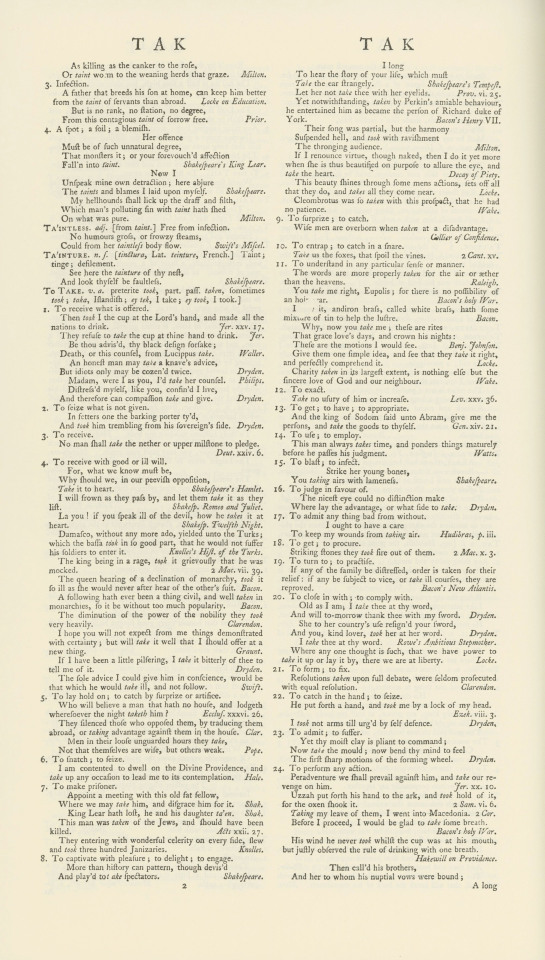
Several of the words in Johnson's dictionary were painstakingly defined. "Take" has 134 definitions running 8,000 words over 5 pages.

Woodcut tailpieces adorn the dictionary interspersed between letters.
Special Collections holds a facsimile reproduction of Johnson's dictionary, published in 1967 by AMS Press of New York.

View other Milestone Monday posts.
-Jenna, Special Collections Graduate Intern
#Milestone Monday#milestones#national dictionary day#holidays#a dictionary of the english language#samuel johnson#w. strahan#William Strahan#milestonemonday#lexicographers#woodcuts#AMS Press#tailpieces#dictionaries#English dictionaries#lexicography
29 notes
·
View notes
Text
If I had to read this then you do too
A recent commentary On Genesis (1977) explains that one of the chief divinities of Abraham's ancestors "was the moon-god Sin, the tutelary deity of the cities of Ur and Haran in southern and northern Mesopotamia. Sin (the Sumerian for it had been /zu-en/, 'knowing Lord'), also called Nannar ('the man in heaven': quite literally 'the man in the moon'), had as his consort Ningal ('the great lady') — that is, the mother goddess who was the woman of the sun." The English word "sin" ultimately derives from this moon-god as does the word "sun." Sun, in turn is related to the word in Genesis — sanwerin — which describes the blinding light used by the angels to stop those Sodomites wanting to get to know them better.
#lingblr#<-you fuckers have to read this too#gay community news#so do you think this guy (writer for gcn) completely lacked access to a dictionary w/ etymology#had access to one but didn't bother checking#or DID check but decided that the religious studies guy probably knew what he was talking about more than the lexicographers
7 notes
·
View notes
Photo
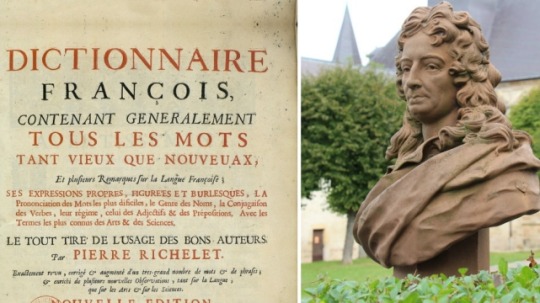
23 novembre 1698 : mort de Richelet, rédacteur du premier dictionnaire unilingue de la langue française ➽ http://bit.ly/Pierre-Richelet Versé dans la poésie et la satire, amoureux de la langue française, Richelet, précepteur éconduit et turbulent régent de collège, devient avocat vers 35 ans avant de s’adonner au culte des muses et de publier son « Dictionnaire français » près de 15 ans avant l’Académie française qui avait pourtant obtenu l’exclusivité royale en la matière
#CeJourLà#23Novembre#Richelet#Grammairien#Lexicographe#Langue#Française#Dictionnaire#Français#Poésie#Poète#Satire#Satiriste#Rédacteur#Littérature#Avocat#Biographie#histoire#france#history#passé#past#français#french#news#événement#newsfromthepast
15 notes
·
View notes
Video
busy bee doing spelling bee
#andy samberg#their kids are gonna grow up to be the coolest lexicographers haha#seth meyers#andy and seth's friendship is so sweet#i love them
64 notes
·
View notes
Text







#A.I#Collins#Collins Dictionary#word of the year#2023 word of the year#greedflation#debanking#nepo baby#deinfluencing#Ultra-processed#semaglutide#ulez#bazball#canon event#artificial intelligence#lexicographers#dictionary#words
5 notes
·
View notes
Text

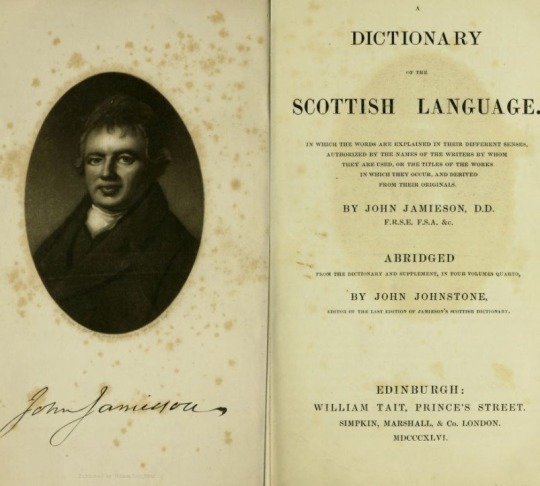
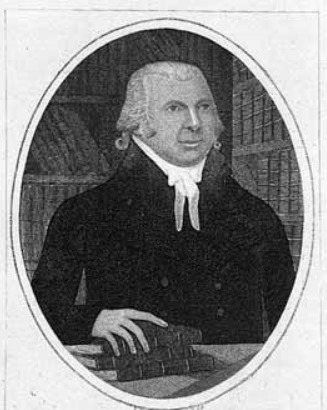
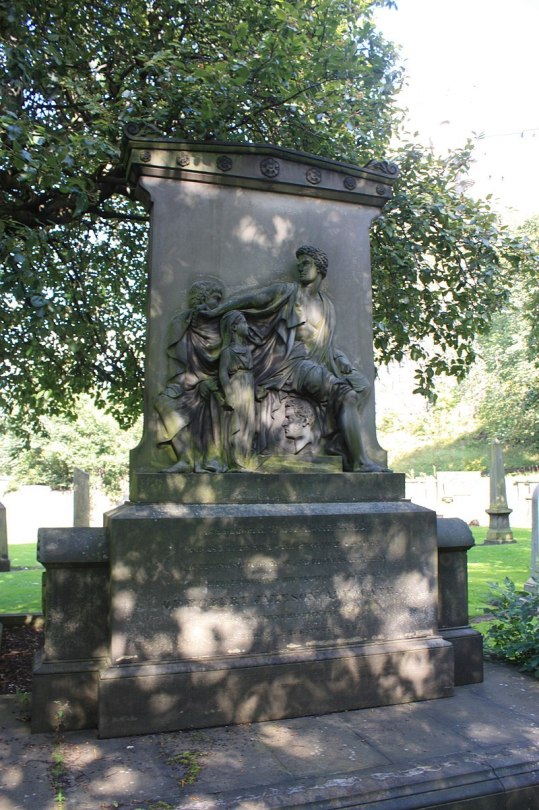
On March 5th 1759 the lexicographer and church minister John Jamieson was born in Glasgow.
I know most of you will not have heard of Jamieson, but his publication, Etymological Dictionary of the Scottish Language, is credited with keeping the language alive. He was a bit of a polymath though and learned in many fields.
The language I am talking about here is Scots, the Scot’s Tongue as it is often referred to, If you have read some of my posts I like to dig out documents etc from days gone by, a most of these are written in Scots, you only have to read the poetry of Robert Fergusson or Rabbie Burns, the vast majority which is written in the language, or up to modern times if you have read any of Irvine Welsh’s books, you will know that as a language it is distinctly different to what is termed as “proper English”
Anyway a bit about the man, Jamieson grew up in Glasgow as the only surviving son in a family with an invalid father, he entered Glasgow University aged at the staggeringly young age of just nine! From 1773 he studied the necessary course in theology with the Associate Presbytery of Glasgow, and in 1780 he was licensed to preach.
Jamieson was appointed to serve as minister to the newly established Secession congregation in Forfar, and stayed there for the next eighteen years, during which time he married Charlotte Watson, the daughter of a local widower, and started a family. Their marriage lasted fifty-five years and they had seventeen children, ten of whom reached adulthood, although only three outlived their father. He next became minister of the Edinburgh Nicolson Street congregation in 1797 where he guided the reconciliation of the Burgher and Anti-Burgher sects to a union in 1820.
In 1788 Jamieson’s writing was recognised by Princeton College, New Jersey where he received the degree of Doctor of Divinity. His other honours included membership of the Society of Scottish Antiquaries, of the Royal Physical Society of Edinburgh, of the American Antiquarian Society of Boston, United States, and of the Copenhagen Society of Northern Literature. He was also a royal associate of the first class of the Royal Society of Literature instituted by George IV.
Jamieson’s chief work, the Etymological Dictionary of the Scottish Language was published in two volumes in 1808 and was the standard reference work on the subject until the publication of the Scottish National Dictionary in 1931. He published several other works, but it is the dictionary he is best known for.
He had a particular passion for numismatics, and it was their mutual interest in coins which led to the first meeting between Jamieson and Walter Scott, in 1795, when Scott was only twenty-three and not yet a published author. Jamieson was also a keen angler, as the many entries relating to fishing terms in the Dictionary attest; and published occasional works of poetry, including a poem against the slave trade which was praised by abolitionists in its day. Entries provided by Scott include besom, which he described as a “low woman or prostitute,” and screed, defined as a “long revel” or “hearty drinking bout”. I wonder how many Scottish females have been called “a wee besom” by their mothers with neither really knowing it’s true meaning!
Jamieson’s association with Walter Scott was a two way thing, he wrote a Scots poem ‘The Water Kelpie’ for the second edition of Minstrelsy of the Scottish Border.
It was through his antiquarian research that Jamieson developed his practice of tracing words (particularly place-names) to their earliest form and occurrence: a method which was to be the foundation of the historical approach he would use in the Dictionary.
Jamieson wrote on other themes: rhetoric, cremation, and the royal palaces of Scotland, besides publishing occasional sermons. In 1820 he issued edited versions of Barbour’s The Brus and Blind Harry’s Wallace.
Revered by authors including Hugh MacDiarmid, who used it to shape his poetic output, Jamieson’s dictionary has long been regarded as a crucial groundwork which kept alive the Scots language at a time when it was in danger of falling into obscurity.
John Jamieson died on July 22nd 1839 and has a fine gravestone in St Cuthbert’s graveyard in Edinburgh, as seen in the fourth pic.
12 notes
·
View notes
Text
emily wilson out here translating the iliad and i am once again wishing i knew how to read and translate ancient greek
#listen where there’s a will there’s a way but i just finished my degree audit and looks like i will only be able to manage a classics minor#with latin emphasis (unless i abandon latin for greek which i’m not going to do even though it pains me)#but i really want to make my own iliad someday….#at this rate i’ll only ever end up making a queer prose adaptation and be criticized for projecting modern notions of sexuality onto a#completely different set of values and social understandings of homosexuality….#(which. if anything there should be more gay people in the song of achilles. don’t be mean to me i promise i understand ancients)#anyway i might just have to make a book of poetry or a novel adaptation or whatever whatever but what if i want to learn the script#and painstakingly translate every single word through years and years of dedication. while also being a librarian as my main thing#shdhdhdf i’m never gonna be classics scholar enough to professionally translate. and if i were it would be latin. but i can dream….#anyway i’m no longer failing my french class (have a 70% that should only be going up) but i’m still failing historical linguistics#my latin grade is great i’m acing it but my library science class is a D (which should be fixed in two days though — just needs more data)#so i am giving myself permission to sleep early tonight and go into class well rested for once. i’m not feeling well but that’s a constant#anyways if anyone reads the wilson iliad let me know!! i’m a fake fan of her work and haven’t read her odyssey (something about the iliad….#there’s a brutality and a raw humanity to it that puts the odyssey at a lower priority to me) but im so freaking excited to read her iliad#i have to prioritize schoolwork but soon. i’ll have to ask my latin teacher about it tomorrow though she’s an iliad enjoyer#anyway good news i think i’ll be able to get a history major with certificates in digital studies and classical studies (the two genders….)#and graduate comfortably in four years with honors in the major. this is ignoring how i’m failing my classes. i promise i won’t be forever#anyways the point is: wilson’s iliad — i will read it as soon as possible and i’m very excited#also i checked out a book from the library called the lexicographers dilemma: the evolution of proper english from shakespeare to south park#but i haven’t had the chance to read it and soon it will be due…. college is evil i’m too busy learning things to learn other things!!!!#anyway if i do honors in the major then i’m excited to eventually earn credit from a capstone thesis which i would do on lexicography#throughout history with an emphasis on classification systems and basically peter mark roget#ok anyway. wandering all over the place but the point is. wilson’s iliad. very exciting. can’t wait to find the time#and eventually i will write an iliad adaptation of my own i will. just not a full translation shdhdf that’s an unrealistic goal#especially when again. my capstone project is going to be about taxonomy of ideas. ancient epics are secondary….#anyway i hope everybody is doing well!! i am going to bed soon-ish but other than that i am around so lmk if you need anything#me. my post. mine.#college talk#delete later
5 notes
·
View notes
Text
le robert de poche: édicule n.m. 1. Dépendance d'un édifice religieux. 2. Petite construction édifiée sur la voie publique (kiosque, urinoir ...)
there has got to be something here that i'm missing. is there maybe some definition of "sur la voie publique" that could include, say, the inside of bathrooms, or am i to believe that in france it is usual to encounter urinals on the side of the road en plein air? because i've been to france and i don't remember any roadside urinals, but maybe i just wasn't paying attention.
#can 'sur la voie publique' just mean more generically 'in public places' which can include public bathrooms?#and if not. are the urinals on the side of the road just there for decoration?? or are they hooked up to the sewer system?#victor hugo did NOT address this in the parisian sewer digression of les mis 😩#or if he did i did not pick up on it lol#i'm just losing it at the lexicographers choosing two examples to provide as to what a petite construction édifiée sur la voie publique#could refer to and they chose kiosk and urinal#or does urinoir have a secondary definition??#lecture du dico#french#my posts#marcel duchamp was french so the answer to this question has implications for like. Art
3 notes
·
View notes
Text
"girl" sounds too childish for what i want to say, "woman" too serious.... we need more synonyms.....
21 notes
·
View notes